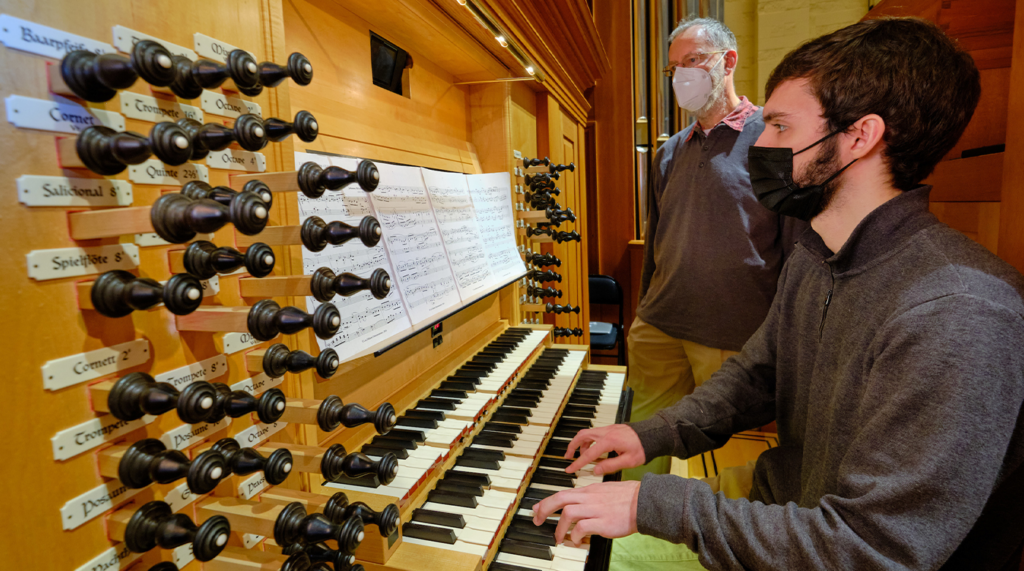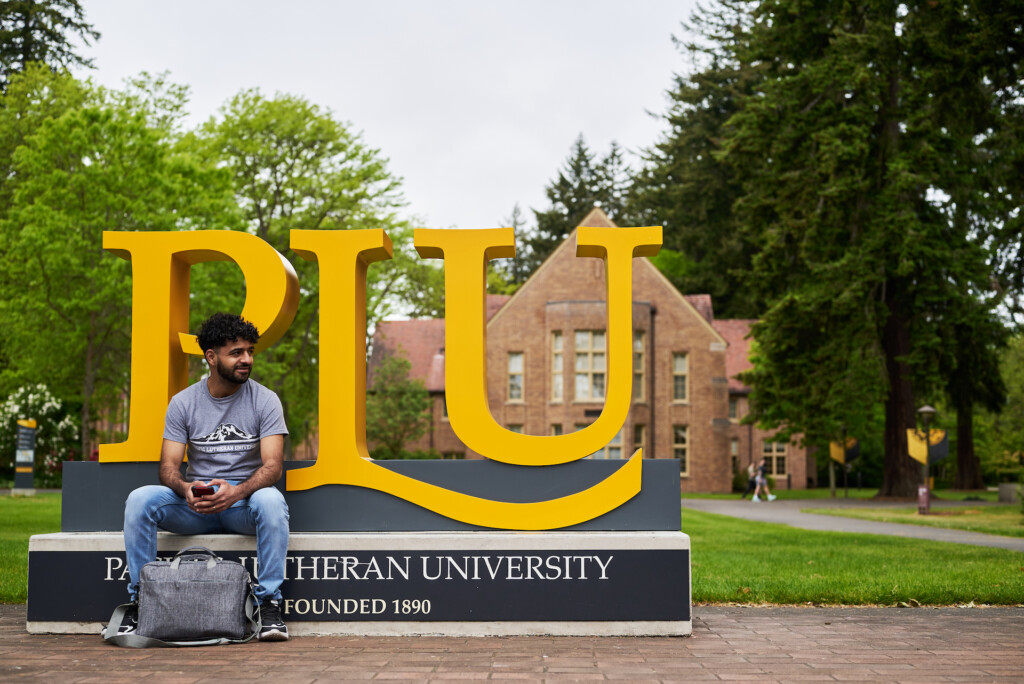Page 38 • (727 results in 0.027 seconds)
-
The ethics of torture Is it ever OK to torture someone?What if they have information that might prevent another 9-11? Or prevent a death of someone you know? And what exactly is torture?These prickly questions will be addressed at a forum sponsored by the Philosophy…
Administration has tweaked the definition of what it considers torture. Now, sleep deprivation and water boarding, where water is poured over the head covered in a sack or cloth to simulate drowning, is not considered torture, she noted. Kaurin holds a PhD in philosophy from Temple University in Philadelphia and is a specialist in military ethics, war theory, philosophy of law and applied ethics. “I guess David and I just want a chance to argue with each other,” Kaurin laughed. “We don’t come from the same
-

Going for a Grammy! Micah Haven ’09 is in his fifth year as band director at Meeker Middle School in Tacoma. (Photo: Tacoma School District) Micah Haven ’09 is 1 of 25 semifinalists for the 2015 Music Education Award By Sandy Deneau Dunham PLU Marketing…
Tacoma Public Schools,” said Zachary Lyman, PLU Associate Professor of Trumpet and Music Theory. “I saw him over the summer, and the care and passion that he brings to his students is unlike anything I have ever seen. It is so inspiring, and this honor is richly deserved for him!” The next step in the Grammy Award process comes in December, when 10 finalists are announced. And then the winner—possibly a Lute with a PLU-infused passion for music and teaching—will be announced during Grammy week 2015
-

Pacific Lutheran University is proud to announce the establishment of the Paul Fritts Endowed Chair in Organ Studies and Performance, thanks to the generosity of longtime university supporter Paul Fritts, owner and founder of Paul Fritts & Co. Organ Builders. Fritts has pledged $2 million…
, music composition theory and conducted the Concert Chorus. “The music department in those early days was small and my father brought his teaching skills to composition classes, choral conducting and other diverse classes,” Fritts said. Fritts founded the Paul Fritts & Co. Organ Builders in 1979, and says he has been dedicated to the design and construction of high-quality pipe organs ever since. His company was commissioned by former music professor David Dahl to develop the Lagerquist Hall organ
-

TACOMA, Wash. — Earlier this week, officials from the University of Puget Sound and Pacific Lutheran University announced the signing of a Memorandum of Understanding that will streamline the process for both universities’ current students and alumni applying to select graduate programs at the partner…
universities’ respective graduate programs offices at gradadmission@plu.edu or graduate@pugetsound.edu. Current students, recent graduates, and all alumni from PLU and Puget Sound are invited to take advantage of the partnership. (Photo by Sy Bean/courtesy University of Puget Sound) PLU Graduate ProgramsThe graduate programs at PLU are designed to combine practice and theory to prepare students to take the next step in their careers. Learn more about our programs. Read Previous National Guard member and
-

For Venice Jakowchuk ’23, a single general education class sparked a passion that has since taken her—literally and/or metaphorically—from Herefordshire, England and Aberdeen, Scotland to the central highlands of Mexico and back to the lands of the Nisqually peoples. Originally from Arizona, Jakowchuk entered PLU…
Arthur’s Stone, a Neolithic chambered tomb.“It was an amazing experience, and it really solidified my love for archeology,” Jakowchuk said. “I knew I liked archeology in the classroom, learning about the theory, the reading and writing. Then getting this hands-on experience gave me that same joy. It was just super exciting.” Because Jakowchuk was a sophomore when COVID hit, her initial plans to study abroad were canceled. But the PLUS Year, a tuition-free fifth year, allowed her to return to the U.K
-
Many students want to know how governments are organized, how rules are made and how government influences the amount and distribution of social rewards.
understanding of politics. The study of political science helps to prepare you for the exercise of your rights, duties and opportunities as citizens. Courses in politics can lead you to fuller understanding of various areas such as American government institutions, legislative processes, foreign policy, international relations, public law and political theory. Many students see the value of combining an understanding of politics with other fields, such as the natural sciences, economics, business
-
Examination Guidelines This policy applies to the core prelicensure nursing courses – N305, N306, N307, N311, N314, N315, N401, N402, and N406 only. Adherence to these guidelines are not required in other prelicensure nursing courses. Exam items will be derived from the course Learning Outcomes which support overall BSN Program Outcomes and Nursing Competencies. Each...
cases, exceptions to this policy will be considered on an individual basis by the course lead faculty. Makeup exams must be completed within 72 hours of the missed exam or as scheduled per instructor discretion. Makeup exams may be taken under individual instructor proctoring or in the test center. All test security requirements also apply to makeup exams. Students repeating a course Evidence-based best practices indicate faculty should strive to offer different versions of examinations for
-
May 4th and May 5th Join the Mathematics Department to hear the senior capstone presentations. Student presentations will take place Friday and Saturday. Talks are scheduled in Morken 214 and 216.
Taylor Lunde Do you think you can solve what might be the world’s most difficult puzzle? The scramble square puzzles consist of only 9 pieces. Each puzzle piece has half of an image displayed on each side. The goal is to arrange the 9 pieces into a 3×3 grid where each image aligns with the other half to create a complete image. We will learn how to find solutions to restricted 2×2 scramble square puzzles using graph theory and introduce a strategy for solving the 3×3 puzzles. 10:30am – Exploring
-
Dining Dollars are an integral part of your meal plan. They should be used during all a la carte meals*, and may be used to purchase an all-you-care-to-eat meal for guests, and snacks or meals all
verification for spending. The card holder is responsible for immediately reporting a lost or stolen LuteCard. Pacific Lutheran University is not liable for damages due to lost or stolen cards. The terms of this agreement begin when the card holder purchases LuteBucks. This agreement expires only upon graduation, formal withdrawal from the university or termination of employment from PLU. Any balance remaining on account at the expiration of this agreement will be refunded with a written request. Evidence
-
By Dana Shreaves, Instructional Designer Considering how to assess students at a distance may seem daunting. Many faculty have always relied on specific assessment practices and believe in-person assessment is the best way to assess student learning. However, the principles underlying good assessment practices are…
require instructors to revisit their learning outcomes and find new ways to collect evidence of learning. Online Assessments Many assessments can be designed for completion or submission online, including: Tests and quizzes using the Sakai Tests & Quizzes tool Presentations recorded and submitted through Sakai Forums or Assignments A quick check of comprehension using Sakai Lessons questions Short (< 3 min) oral responses posted to Forums, Assignments, or Tests & Quizzes Collaborative papers drafted
Do you have any feedback for us? If so, feel free to use our Feedback Form.


